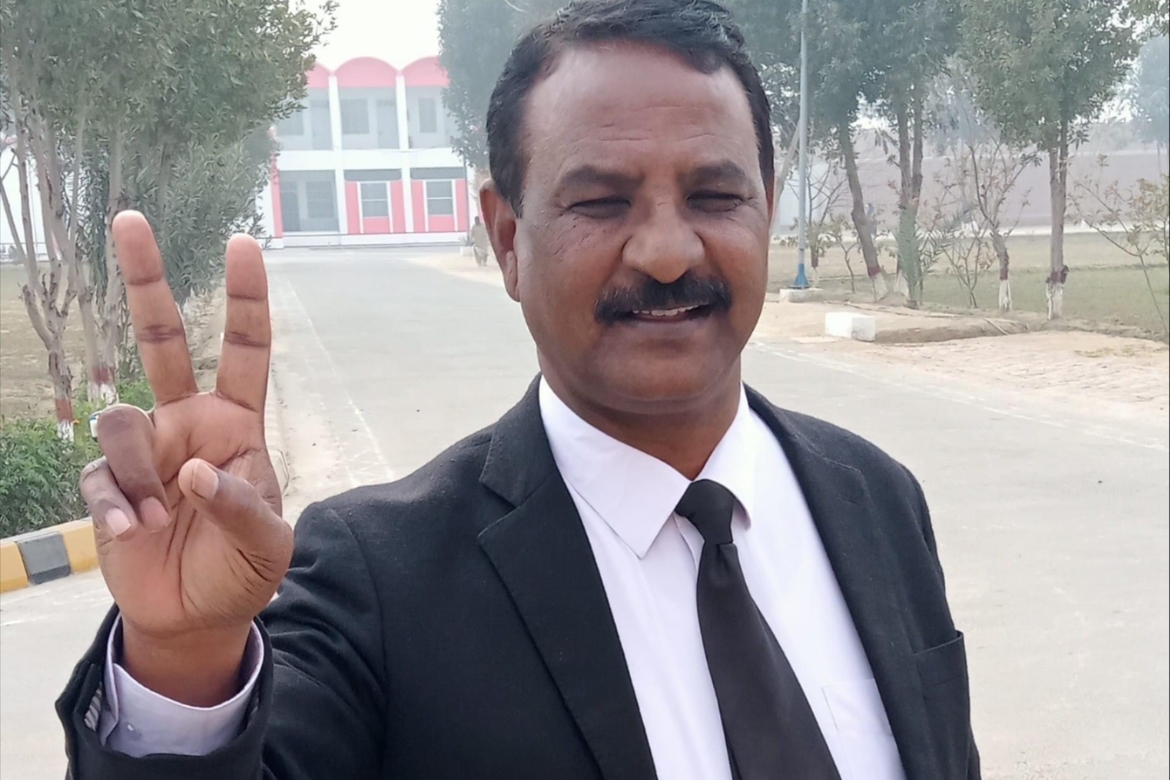Acquittal of Mentally Ill After 12-Year Incarceration for Blasphemy
For the seventh time, the Stefanus Alliance saves people in death penalty cases through its partner in Pakistan.

Lawyer Lazar Allah Rakha persuaded the court that the mentally ill man should be acquitted of - unproven - blasphemy charges.
Picture by HFO. First published on stefanus.no 02.06.2024
Asif Idrees has been in prison or a mental hospital since January 2012, accused of blasphemy. Now, he has finally been acquitted with the support of the Human Friends Organization, the Stefanus Alliance's partner in Pakistan. Asif Idrees is from the Ahmadiyya community. He was detained, accused of blasphemy under section 295-C of the penal code, which carries the death penalty.
Sajid Christopher at HFO is pleased with the acquittal verdict. HFO engaged lawyer Lazar Allah Rakha, who took on a case that other lawyers over the years have not dared to pursue. Blasphemy cases are serious and sensitive. Moreover, when the accused is Ahmadiyya, it is even more sensitive since it is forbidden for people from this community to call themselves Muslims in Pakistan. They consider themselves Muslims.
Sajid Christopher says, “The HFO team worked hard and tirelessly to save Asif Idrees.”
Mental Health Issues
Asif Idrees has also been admitted to a mental hospital, which has declared that he has mental health problems. Idrees was brought to court because it was alleged that he claimed to be the last prophet of God.
Lawyer Lazar Allah Rakha argued in court that Asif Idrees was falsely implicated in the case by the prosecution, which lacked evidence. They also did not present a report indicating that Idrees had significant mental health problems.
The judge was highly critical of the prosecution. He stated that the only possible conclusion was that the prosecution had 'miserably' 'failed' to produce evidence. He asserted that doubt must be in favor of the accused, who was therefore acquitted. The judge emphasized that the doubt benefiting the accused is not a form of mercy but a right.
Doubts regarding Appeal
There is a 30-day deadline for the prosecution to appeal to the High Court. Christopher doubts that there will be an appeal. Idrees is still in prison since he is also accused in a case involving an altercation with a fellow inmate.
“We will work to get him out of that case as well and out of prison,” says Christopher.
The seventh case involving a death sentence
This is the seventh case where HFO's legal assistance has resulted in the acquittal of blasphemy victims. These are cases where they have either been sentenced to death or faced the risk of a death sentence," says Christopher. One of these cases is that of the Adventist Sajjad Masih Gill, who was acquitted in November 2021 after ten years in prison.
Another case was that of Asia Bibi - she spent nearly ten years in prison, more than eight of them under a death sentence, before being acquitted by the Supreme Court. Her acquittal was upheld by the Supreme Court twice in 2018/2019.
Sawan Masih was acquitted in October 2020.
HFO is still waiting, among other cases, for the appeal hearing of Asif Pervaiz, a Christian father of four sentenced to death. He has been in prison for almost 11 years.
A significant problem in Pakistan is that blasphemy charges can be made without evidence and without the risk of punishment for false accusations.
Last year, Pakistan made its infamous blasphemy law even more extensive: the minimum penalty was raised to 10 years in prison, and Muhammad's wives were among those included - alleged offenses against them can also result in life imprisonment.
International Attention
The U.S. Commission on International Religious Freedom (USCIRF) recently released its own report on Pakistan's blasphemy law. It documents how Pakistan's religious minorities are disproportionately affected by the law. It highlights selected examples of recent blasphemy cases, including those against Pakistan's Ahmadiyya Muslim community. The report also provides an overview of Pakistani officials' efforts to strengthen and justify the legislation both domestically and on the international stage.
Written by Johannes Morken